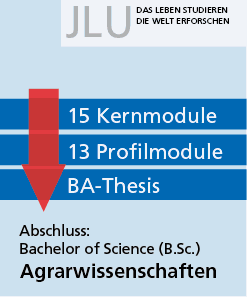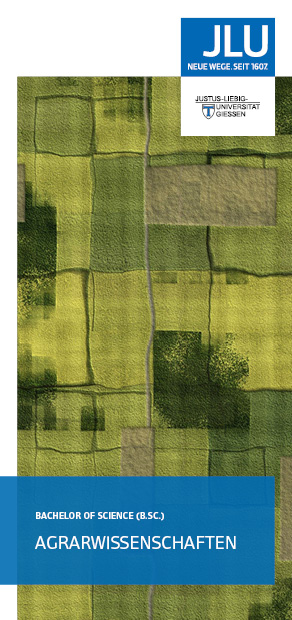Agricultural Sciences (B.Sc.)
Taught in German
Overview
- Overview
-
Overview
How will we feed 10 billion people in the future? How do we produce and market high-quality food? How do we breed and keep farm animals in a species-appropriate way? How do we protect plants? How does organic farming work? These and other exciting questions are addressed in the Bachelor's degree programme in Agricultural Sciences. Students learn about agriculture from all sides and understand the entire agricultural system.
Agriculture has long since ceased to be what it once was: climate change makes it necessary for us to find ways to reduce our consumption of resources, release fewer greenhouse gases into the atmosphere, protect the environment and preserve biodiversity. Nevertheless, we want to produce high quality food to feed the growing world population. An important role is played by progressive digitalisation both in the field and in the barn, which fundamentally changes the work in agriculture, increases efficiency in production and supports farmers in doing more for the environment, climate and animal welfare. In the agricultural sciences degree programme, our students are actively involved in solving important social and environmental problems. The basis of the study programme is formed by basic natural science subjects such as biology, chemistry, mathematics and statistics. Building on this, students receive basic training in the disciplines of plant and animal production as well as agricultural economics and agricultural technology. Social sciences and ecology also play a role. This approach from different directions is called interdisciplinary. In addition, our students acquire interdisciplinary skills such as science-led work and presentation.Requirements of this course of study
In addition to the formal entry requirements (see application), we expect fun in the science of life, flexibility, solution-oriented thinking and a pragmatic approach to the challenges of everyday life. Basic knowledge of mathematics, chemistry and biology is an advantage. JLU offers preliminary courses in which you can brush up on your knowledge before starting your studies. This way you are optimally prepared for your studies.
-
Number of enrolled students
351 students are enrolled in this bachelor degree course (as of winter semester 2022/23).
Accreditation
since 28 September 2007.
Composition of the Study Programme
- Degree BSc
-
Degree
Bachelor of Science (BSc)
- Standard period of study
-
6 semesters - 180 credit points (CP)
The course of studies will be revised for the winter semester 2022/23 and will probably be adjusted as follows.
- Composition of the Study Programme
-
Composition of degree programme

The study contents are divided into modules. Each module has a scope of 6 CP (four semester hours per week) and concludes with a course-related examination.
17 of the modules are compulsory (core modules), 11 modules are profile modules and can be selected from the entire range of courses offered by the department. The Bachelor's thesis corresponds to the scope of two teaching modules.
Individual specialisation takes place through the choice of profile modules. The degree programme is successfully completed when all modules have been passed.
- Structure of Studies in BSc Agricultural Sciences
-
Components of the study programme
The programme consists of 17 core modules (compulsory modules) and 11 profile modules (elective modules). Each module has a scope of 6 CP (4 hours per week for one semester) and concludes with a course-related examination. The grades achieved in the individual module examinations result in the final degree grade. In addition, the programme includes a Bachelor's thesis, which is equivalent to 2 modules. This proves that you are capable of independently writing a scientific paper.
Individual profile
The development of an individual profile plays a major role in the degree programme. Our students decide for themselves whether they want to acquire a broad all-round knowledge or prefer to specialise, whether their studies are more practice-oriented or scientific and theoretical. They can choose profile modules from the complete range of courses offered by the Department 09 or even from other departments at JLU.
Practical relevance
In addition to choosing practice-oriented modules, students have the opportunity to complete an internship to gain a first insight into professional life. Module BP 144 "Professional Internship" corresponds to 12 CP and can be chosen as a profile module in all Bachelor's degree programmes of Faculty 09. In this way, students familiarise themselves with the professional world and get suggestions for the individual organisation of their further studies. The Internship Office maintains a database of suitable companies and institutions and supports students in their search for a suitable internship.
Structure of studies
1st semester 2nd semester 3rd semester Economics and Business Administration Basics of biochemistry Mathematics and Statistics Soil Science and Ecology Operational production economics Crop Production Agricultural Engineering I Politics of the agricultural and food economy Animal Nutrition
Biology Animal Breeding Plant Nutrition Introductory chemistry practical course Plant Breeding I Phytomedicine 4th semester 5th semester 6th semester Livestock production and livestock ethology Specialisation Module 4 Specialisation Module 9 Organic Farming Specialisation Module 5 Specialisation Module 10 Specialisation Module 1 Specialisation Module 6 Specialisation Module 11
Specialisation Module 2 Specialisation Module 7 Bachelor's Thesis Specialisation Module 3 Specialisation Module 8 Bachelor's Thesis Specialisation modules
Broad all-round knowledge or specialisation - both are possible. Our students have it in their hands, they put together their studies according to their individual inclinations from the whole range of our offer. In a catalogue of over 80 modules, students can choose profile modules from the following topics, for example:
- Economics
- Business Administration
- Agricultural, food and environmental policy
- Insect Biotechnology
- Soil science and soil protection
- Plant cultivation and plant breeding
- Plant Nutrition
- Renewable raw materials and bioresources
- Bioinformatics
- Organic Farming
- Animal Breeding and Husbandry
- Animal Nutrition
- Communication and advisory services
- Practical relevance
-
Practical relevance
During their studies students have the opportunity to do a professional practical training of 9 weeks (12 credit points), during which they become familiar with professional reality and are encouraged in the individual structuring of their studies. The Practical Training Office provides a data base of suitable businesses and institutions.
Application
- Commencement of Studies in the Winter Semester
-
Commencement of studies
Only possible in the winter semester
- Entrance Requirements Abitur ohne Praktikumsnachweis
-
Entrance requirements
- Applicants must have an Abitur (German school leaver's examination for university entrance) or equivalent. More on this...
- Certification of a pre-professional practical period is not required.
-
Special regulations apply to foreign applicants or those who gained their university-entrance qualifications abroad. Read more...
- Application not limited only winter
-
-
Application / Enrolment
-
The study programme is not subject to admission restrictions.
-
The enrolment period for the winter semester begins at the beginning of June.
-
The end of the enrolment period is determined anew each year, please enquire in the application portal during the enrolment period.
Different rules apply in some cases for international applicants. More...
-
-
Career Options
- Career Options
-
Programmes of further study at JLU
The following consecutive Master's degrees are offered by JLU:
- Agrar- und Ressourcenökonomie (M.Sc.)
- Agrobiotechnology (M.Sc.) - (taught in english)
- Informationstechnologie in den Agrar- und Umweltwissenschaften (M.Sc.)
- Insect Biotechnology and Bioresources (M.Sc.) - (taught in english)
- Nachhaltige Ernährungswirtschaft (M.Sc.)
- Nutztierwissenschaften (M.Sc.)
- Nutzpflanzenwissenschaften (M.Sc.)
- Sustainable Transition (M.Sc.) - (taught in english)
- Tranistion Management (M.Sc.) - (taught in english)
- Umweltwissenschaften (M.Sc.)
Additionally, JLU's Faculty 09 offers the following Master's degrees.
Career options
Graduates of the degree programme in Agricultural Sciences can be employed in the environment and at all levels of agricultural production as well as in the upstream and downstream areas. Possible employers can be found at state institutions, professional associations, in the private sector, in research, or at international organisations / non-governmental organisations. The following is a selection of possible employers:
Federal and Land Ministries:
- Offices for Agriculture and Rural Development
- Chambers of Agriculture
- Environmental, land consolidation and settlement offices
- Agricultural testing institutes
- State institutes for plant protection
- Federal Plant Variety Office
Associations:
- Agricultural associations
- Machinery and farm relief associations
- Livestock associations and producer groups
- Organic farming and certification associations
Private sector:
- Breeding and plant protection companies
- Fertiliser companies
- Animal feed and animal health companies
- Agricultural technology companies
- Food and nutrition industry
- Bioenergy industry
- Insurance companies
- (Large) agricultural enterprises
Research:
- Universities and technical colleges
- Federal institutes and agricultural research institutes (e.g. JKI, IPK)
- International agricultural research centres (e.g. IRRI, CIMMYT, IFPRI, etc.)
- Research departments of large agricultural companies
International organisations and NGOs:
- German Society for International Cooperation (GIZ)
- FAO and other UN agencies
- NGOs such as Welthungerhilfe, FIAN, Brot für die Welt, Caritas, etc.
Further Information
- Further Information: Documents
-
PDF documents for the courses of study
- Flyer (in German)
- Study guide (in German)
Examination- and study regulations
- Special regulations (in German)
(with module descriptions and module plans) (in English)
(Please note that only the German version of the modules is offical and legally binding. The english Version is for informative purposes only.) - General study regulations for modular and multi-stage study programmes
Courses offered in the course catalogue
- Electronical course catalogue (in German)
- Bachelor's Degree Programmes of Faculty 09
- International pages
-
Please have a look at our International Pages for more information in English.
- Any Questions
-

Any Questions?
Information- and advisory services of JLU can be found under the category “contact” on this page!
- Help
-
Do you need assistance in choosing the right courses of study?
- Offers: Courses of study
-
Which courses of study suits me best?

Ask Justus offers information for prospective students
Events for prospective students

There is a whole range of events offered by JLU, current events can be found under “news”:
www.uni-giessen.de/studium (in German)
Contact
- Contact
- Subject Advisors
- Agrar
-
Prof. Dr. Bernd Honermeier
Institut für Pflanzenbau und Pflanzenzüchtung ISchubertstraße 81
35392 Gießen
Phone: 0641 - 99 37441
Office hours: by appointment
E-Mail: Bernd.Honermeier@agrar.uni-giessen.de
- Central Study Advisor
- Anja Staffler
- Central Student Services
-
- Students office →
(for formal matters like matriculation) - Central student advisory office
(advice for students & prospective students) - Hotline Call Justus
(first contact for all matters pertaining to studies) - International office →
(for international students)
- Students office →

